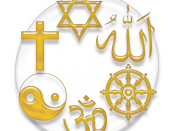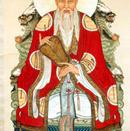Be it a God, some eternal cycle, or even science, all peoples believe in some sort of central universal power that brought about existence - a higher power under which all things are subject. Western traditions predominantly preach monotheism: that there is one all-powerful God to who is to be worshipped, and that faith will allow entrance into a Paradise after death. Eastern traditions on the other hand, such as those originating in China and India, are panentheistic in their view of God - that He/Her/It is manifest in all things. Taoism and Hinduism, while apparently worlds apart from Western traditions, are in fact much more similar than they may appear at first glance. Being a very diverse umbrella of varying beliefs, the Vedanta school of Hindu thought (the most popular) will be drawn upon exclusively in this essay for purposes of simplicity. While the Abrahamic religions of Western origin (Judaism, Christianity and Islam) are centered on an all-powerful God responsible for creation, destruction, retribution, reward, and even directly intervening occasionally throughout history, Indic and Chinese beliefs generally offer no shortage of Gods and deities, often allowing for confusion between roles.
Each faith does, however, believe in a central, unseen force that essentially plays the role that God does in Western beliefs, namely the concept of Brahman and the Karma system of Hinduism and Taoism's idea of the Tao. The underlying difference being that this central God/figure/force serves as an archetype for an array of demigods, which are also worshipped as one of many possible avenues to salvation. Thus, as Hinduism and Taoism's equivalents to Allah, Yahweh, or the Trinity, the concepts of Brahman in conjunction with the karma system, and the Tao, essentially replace what is known in Abrahamic philosophy as the 'will of God'.
Far to the east,


